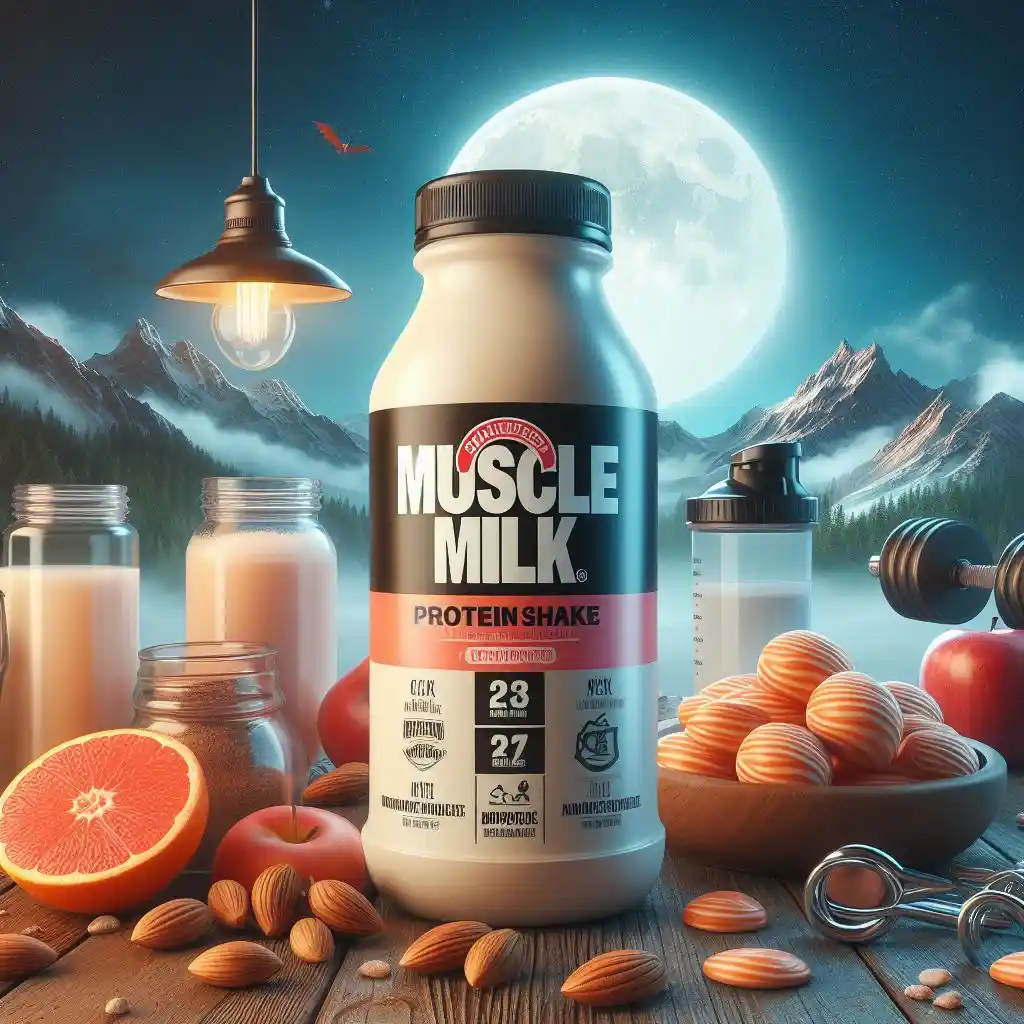Does Muscle Milk Need to Be Refrigerated? Shelf Life & More
Muscle Milk, a popular protein supplement, is a staple in many fitness enthusiasts’ and athletes’ diets. But have you ever wondered what happens when you leave it sitting on the counter for a few days?
Does Muscle Milk need to be refrigerated, or can it withstand room temperature without compromising its quality and safety?
In this article, we’ll dive into the world of Muscle Milk storage, exploring the importance of refrigeration, shelf life, and expiration dates to ensure you get the most out of your supplement.
Does Muscle Milk Need to Be Refrigerated? Quick Answer

- Unopened Muscle Milk: No, unopened Muscle Milk does not need to be refrigerated. It can be stored at room temperature (up to 80°F/27°C) for up to 12 months.
- Opened Muscle Milk: Yes, opened Muscle Milk should be refrigerated to prevent spoilage and maintain quality. Store it in the refrigerator at a temperature of 40°F (4°C) or below.
Shelf Life of Muscle Milk:
- Unopened: 12 months from the manufacture date
- Opened: 3-5 days in the refrigerator
Tips for Storing Muscle Milk:
- Store unopened Muscle Milk in a cool, dry place, away from direct sunlight and moisture.
- Once opened, refrigerate Muscle Milk promptly and consume within 3-5 days.
- Always check the expiration date and the condition of the product before consuming.
- If you notice any changes in smell, taste, or texture, it’s best to err on the side of caution and discard the product.
Expiration Dates:
- Check the expiration date printed on the packaging or label.
- If the expiration date has passed, it’s recommended to discard the product, even if it looks and smells fine.
Unopened Muscle Milk: Storage and Shelf Life
When it comes to unopened Muscle Milk, storage and shelf life are crucial factors to consider. Here’s what you need to know:
Storage Conditions:
- Unopened Muscle Milk can be stored at room temperature (up to 80°F/27°C) for up to 12 months.
- Avoid storing Muscle Milk in direct sunlight, high humidity, or extreme temperatures.
- Keep the product away from strong-smelling foods, as the powder can absorb odors easily.
Shelf Life:
- Unopened Muscle Milk has a shelf life of 12 months from the manufacture date.
- The manufacture date can be found on the packaging or label.
- If stored properly, Muscle Milk will retain its quality and potency throughout its shelf life.
Tips for Storing Unopened Muscle Milk:
- Store the product in its original packaging to maintain freshness.
- Keep the container tightly sealed when not in use.
- Avoid stacking heavy objects on top of the container to prevent damage.
Opened Muscle Milk: Refrigeration and Storage Tips

Once you’ve opened your Muscle Milk, it’s essential to store it properly to maintain its quality and safety. Here’s what you need to know:
Refrigeration:
- Opened Muscle Milk should be refrigerated at a temperature of 40°F (4°C) or below.
- Refrigeration helps prevent bacterial growth and spoilage.
- Make sure the container is tightly sealed before refrigerating to prevent contamination.
Storage Tips:
- Store opened Muscle Milk in the refrigerator at a consistent refrigerator temperature.
- Keep the container away from strong-smelling foods, as the powder can absorb odors easily.
- Avoid storing opened Muscle Milk near heat sources, ovens, or direct sunlight.
Shelf Life:
- Opened Muscle Milk has a shelf life of 3-5 days in the refrigerator.
- Consume the product within this timeframe to ensure quality and safety.
- If you notice any changes in smell, taste, or texture, it’s best to err on the side of caution and discard the product.
Tips for Consuming Opened Muscle Milk:
- Use a clean scoop or spoon to measure out your serving to prevent contamination.
- Mix the product with cold water or your preferred beverage to prevent bacterial growth.
- If you don’t plan to consume the entire container within 3-5 days, consider transferring the remaining product to an airtight container and freezing it (see below).
The Importance of Refrigeration: Why It Matters

Refrigeration plays a crucial role in maintaining the quality and safety of opened Muscle Milk. Here’s why refrigeration matters:
Prevents Bacterial Growth:
- Muscle Milk is a nutrient-rich supplement that can support the growth of bacteria, yeast, and mold.
- Refrigeration slows down bacterial growth, preventing the formation of harmful toxins and spoilage.
Maintains Nutrient Integrity:
- Refrigeration helps preserve the nutritional content of Muscle Milk, including protein, vitamins, and minerals.
- Proper refrigeration ensures that the product remains effective and potent throughout its shelf life.
Reduces Oxidation:
- Muscle Milk contains lipids that can oxidize when exposed to heat, light, or oxygen.
- Refrigeration slows down oxidation, preventing the formation of off-flavors, off-odors, and rancidity.
Enhances Safety:
- Refrigeration prevents the growth of harmful microorganisms that can cause foodborne illnesses.
- Proper refrigeration ensures that Muscle Milk is safe to consume and reduces the risk of contamination.
Best Practices:
- Always refrigerate opened Muscle Milk at a temperature of 40°F (4°C) or below.
- Use a clean and airtight container to store the product.
- Check the product regularly for signs of spoilage and discard it if you notice any changes in smell, taste, or texture.
Muscle Milk Expiration Dates: What You Need to Know

Understanding Muscle Milk expiration dates is crucial to ensure the quality and safety of your supplement. Here’s what you need to know:
What Do Expiration Dates Mean?
- Expiration dates indicate the last day the product is guaranteed to retain its quality, potency, and safety.
- Expiration dates are not the same as “best by” or “best if used by” dates, which refer to the product’s peak quality and flavor.
How to Check Expiration Dates:
- Check the packaging or label for the expiration date, which is usually printed in the format “MM/DD/YYYY” or “YYYY-MM-DD”.
- Make sure to check the expiration date before purchasing or consuming Muscle Milk.
What Happens After the Expiration Date?
- After the expiration date, the product may not retain its quality, potency, or safety.
- Consuming expired Muscle Milk may not provide the desired benefits, and in rare cases, may cause adverse effects.
Tips for Managing Expiration Dates:
- Always check the expiration date before purchasing Muscle Milk.
- Store Muscle Milk in a cool, dry place to maintain its quality and extend its shelf life.
- Rotate your stock to ensure older products are consumed before newer ones.
- Discard any expired or spoiled Muscle Milk to avoid potential health risks.
What If I’ve Already Opened the Product?
- Once opened, Muscle Milk has a shorter shelf life (typically 3-5 days in the refrigerator).
- Consume opened Muscle Milk within the recommended timeframe to ensure quality and safety.
Signs of Spoilage: How to Tell If Your Muscle Milk Has Gone Bad
Even with proper storage and handling, Muscle Milk can still spoil if not consumed within a reasonable timeframe. Here are some signs to check for to determine if your Muscle Milk has gone bad:
Visual Inspection:
- Check for any visible signs of mold, yeast, or bacterial growth on the surface of the powder or in the container.
- Look for any changes in color, texture, or consistency, such as clumping, lumping, or discoloration.
Smell and Odor:
- Check for any unusual or unpleasant odors, such as a sour, bitter, or acidic smell.
- If the powder smells stale, musty, or like ammonia, it may be a sign of spoilage.
Taste and Texture:
- If the powder tastes bitter, sour, or unpleasantly sweet, it may be a sign of spoilage.
- Check for any changes in texture, such as clumping, lumping, or a gritty feel.
Other Signs:
- Check the expiration date or “best by” date on the packaging. If it’s past the expiration date, it’s best to err on the side of caution and discard the product.
- If you notice any changes in the product’s appearance, smell, or taste, it’s best to discard it, even if it’s within the expiration date.
What to Do If Your Muscle Milk Has Gone Bad:
- Discard the spoiled product immediately to avoid any potential health risks.
- Clean and sanitize any containers or utensils that came into contact with the spoiled product.
- Consider reporting the issue to the manufacturer or retailer if you suspect a quality control issue.
Storing Muscle Milk in Different Environments: What to Consider

When storing Muscle Milk, it’s essential to consider the environment in which you’re storing it. Different environments can affect the quality and shelf life of your supplement. Here’s what to consider:
Room Temperature (Up to 80°F/27°C):
- Suitable for unopened Muscle Milk with a shelf life of up to 12 months.
- Avoid storing in direct sunlight, high humidity, or extreme temperatures.
Refrigeration (40°F/4°C or Below):
- Ideal for opened Muscle Milk with a shelf life of 3-5 days.
- Prevents bacterial growth and maintains nutrient integrity.
Freezer (-18°C/0°F or Below):
- Suitable for long-term storage of unopened Muscle Milk.
- Freezing preserves the product’s quality and shelf life.
High-Humidity Environments:
- Avoid storing Muscle Milk in humid environments (above 60% relative humidity).
- High humidity can cause clumping, caking, or spoilage.
Direct Sunlight:
- Avoid storing Muscle Milk in direct sunlight, as it can cause degradation of nutrients and spoilage.
Extreme Temperatures:
- Avoid storing Muscle Milk in extreme temperatures (above 90°F/32°C or below 32°F/0°C).
- Extreme temperatures can cause degradation of nutrients and spoilage.
Tips for Storing Muscle Milk:
- Always check the product’s packaging for specific storage instructions.
- Store Muscle Milk in its original packaging to maintain freshness.
- Keep the container tightly sealed when not in use.
The Impact of Temperature on Muscle Milk Quality
Temperature plays a critical role in maintaining the quality and shelf life of Muscle Milk. Here’s how different temperatures can affect your supplement:
High Temperatures (Above 80°F/27°C):
- Can cause degradation of nutrients, including protein, vitamins, and minerals.
- May lead to the growth of bacteria, yeast, and mold.
- Can affect the texture and consistency of the powder, making it clumpy or lumpy.
Room Temperature (Up to 80°F/27°C):
- Suitable for short-term storage of unopened Muscle Milk.
- May cause a slight degradation of nutrients over time.
Refrigeration (40°F/4°C or Below):
- Ideal for storing opened Muscle Milk, as it slows down bacterial growth and maintains nutrient integrity.
- Prevents the growth of bacteria, yeast, and mold.
Freezer (-18°C/0°F or Below):
- Suitable for long-term storage of unopened Muscle Milk.
- Preserves the product’s quality and shelf life by preventing degradation of nutrients.
Temperature Fluctuations:
- Avoid exposing Muscle Milk to frequent temperature fluctuations, as this can cause degradation of nutrients and affect the product’s quality.
Tips for Maintaining Optimal Temperature:
- Store Muscle Milk in a consistent refrigerator temperature (40°F/4°C or below).
- Avoid storing Muscle Milk near heat sources, ovens, or direct sunlight.
- Use a thermometer to monitor the temperature of your storage environment.
Best Practices for Consuming and Storing Muscle Milk
To get the most out of your Muscle Milk supplement, follow these best practices for consuming and storing:
Consuming Muscle Milk:
- Always check the expiration date or “best by” date on the packaging before consuming.
- Consume Muscle Milk within the recommended timeframe (typically 3-5 days after opening).
- Mix Muscle Milk with cold water or your preferred beverage to prevent bacterial growth.
- Use a clean scoop or spoon to measure out your serving to prevent contamination.
Storing Muscle Milk:
- Store unopened Muscle Milk in a cool, dry place, away from direct sunlight and heat sources.
- Store opened Muscle Milk in the refrigerator at a temperature of 40°F (4°C) or below.
- Keep the container tightly sealed when not in use to prevent contamination.
- Avoid storing Muscle Milk near strong-smelling foods, as the powder can absorb odors easily.
Tips for Maintaining Freshness:
- Rotate your stock to ensure older products are consumed before newer ones.
- Check the product regularly for signs of spoilage, such as clumping, lumping, or an off smell.
- Discard any expired or spoiled Muscle Milk to avoid potential health risks.
FAQs
Q: How long does Muscle Milk last after opening?
A: Opened Muscle Milk typically lasts for 3-5 days in the refrigerator.
Q: Can I store Muscle Milk in the freezer?
A: Yes, you can store unopened Muscle Milk in the freezer to preserve its quality and shelf life.
Q: What happens if I consume expired Muscle Milk?
A: Consuming expired Muscle Milk may not provide the desired benefits and may cause adverse effects. It’s best to discard expired products to avoid potential health risks.
Q: Can I mix Muscle Milk with hot water?
A: No, it’s not recommended to mix Muscle Milk with hot water, as it can cause the protein to denature and affect the product’s quality.
Q: How should I store Muscle Milk to maintain its quality?
A: Store Muscle Milk in a cool, dry place, away from direct sunlight and heat sources. Keep the container tightly sealed when not in use.
Q: What if I notice a change in the smell or texture of my Muscle Milk?
A: If you notice any changes in the smell, texture, or appearance of your Muscle Milk, it’s best to discard the product to avoid potential health risks.

DK Jacks is a passionate food enthusiast, recipe developer, and culinary explorer. With a love for both traditional and innovative flavors, DK brings a fresh perspective to the kitchen. When not experimenting with new ingredients, you’ll find DK capturing food moments through the lens or sharing cooking tips with fellow foodies.🍽️📸✨






